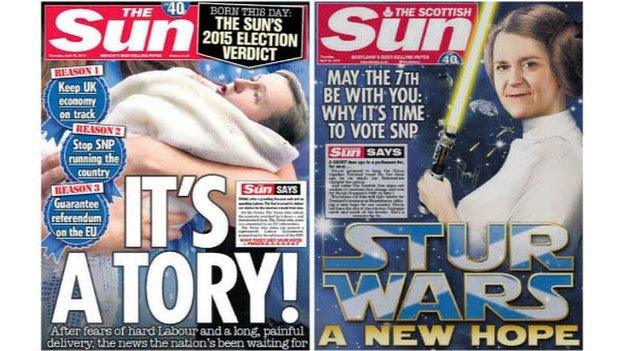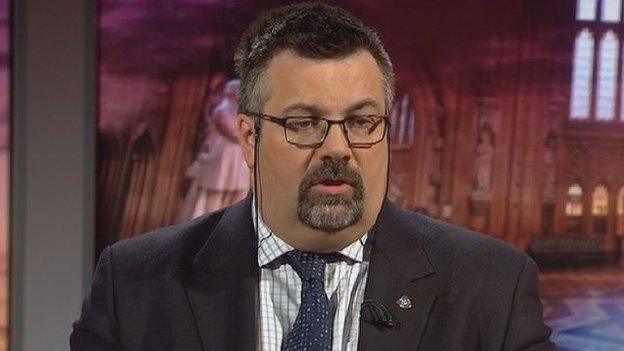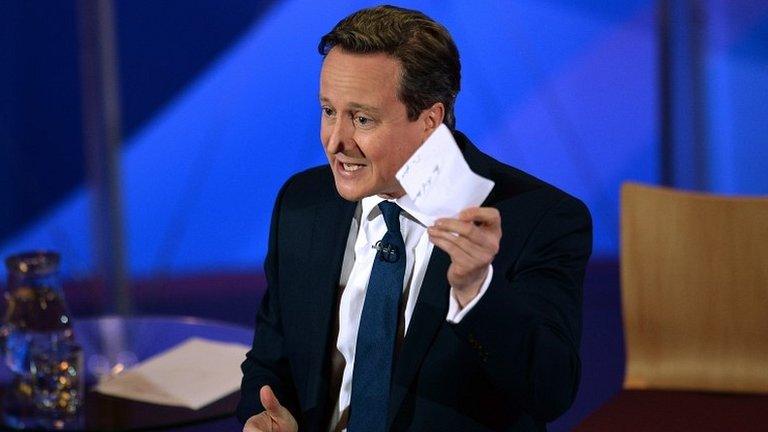Election 2015: The Sun and the Scottish Sun endorse rival parties
- Published
- comments

The UK and Scottish editions of the Sun have taken contrasting views on the general election
The Sun and its sister paper, the Scottish Sun, have endorsed different parties in the general election.
Its London-based version urged readers to back the Conservatives, external and "stop the SNP running the country".
By contrast, the Scottish Sun, external said the Tories did not understand Scotland and praised SNP leader, Nicola Sturgeon, as "a phenomenon who inspires people".
It comes as one opinion poll suggested the SNP could be on track to win all of Scotland's 59 seats.
The newspapers are the two biggest selling dailies north and south of the border.
They are both part of the newspaper group News UK, formerly called News International, which is owned by Rupert Murdoch.
'Campaign star'
The Scottish Sun - which also supported the SNP in the Scottish parliament elections in 2011 - said Ms Sturgeon had been the "star" of the campaign.
Its front page, inspired by Star Wars, pictured Ms Sturgeon as Princess Leia and encouraged voters to back her as a "new hope" for Scotland.
The Scottish Sun newspaper is urging its readers to vote for the SNP in the general election
The Sun meanwhile portrayed David Cameron as a newborn baby, and said after a "long painful delivery" the newspaper had decided to back the Conservatives.
It described the SNP as "wreckers" and said the Tories were the "best bet for millions of ordinary people".
It warned of what it called a Labour/SNP "nightmare".

Who has backed a party in the election campaign?
The Sun -Conservatives
Scottish Sun - SNP
Mirror - Labour
Express - owner Richard Desmond has given £1m to UKIP
Financial Times - has called for tactical voting to produce another coalition between the Conservatives and Lib Dems
Papers who have not declared
Daily Mail - backed the Conservatives in 2010 - as did the Mail on Sunday
Telegraph - both daily and Sunday editions backed the Conservatives in 2010
The Guardian - backed the Liberal Democrats in 2010
Observer - backed the Liberal Democrats in 2010
The Times - backed the Conservatives in 2010
Independent on Sunday - said it is not advising readers how to vote in 2015

Andrew Nicoll, political editor of the Scottish Sun, said the newspapers' split reflected "two distinct editorial positions from two distinct, editorially-diverse newspapers".
"We are a Scottish newspaper, run in Scotland, printed in Scotland, produced in Scotland by Scots, and it's not a surprise to anybody - least of all Rupert Murdoch - that these two papers have a diversion of view tonight," he said.
He denied that it was a cynical move to block Labour leader Ed Miliband from power, or a commercially-driven decision.
"In the time that I've worked at the Sun we've supported the Labour Party, the SNP, the Tories. We've fought vigorously against the SNP, we've supported the SNP.

Andrew Nicoll of The Scottish Sun: "We're acting from a Scottish perspective for a Scottish readership."
"Sometimes that support has gone the way the vote has gone, sometimes it hasn't.
"The people of Scotland seem to have chosen the SNP, and we're going with them."
A spokesman for the Sun said: "The Sun is written first and foremost for its readers, and the UK edition and Scottish edition have two very distinct audiences.
"If Scotland and England were playing each other at football, no one would expect the Scottish Sun to support the English national team."
The BBC's Scotland correspondent Colin Blane said what the two Murdoch titles had in common was a front page comment attacking Labour.
History of allegiance
Both editions of the newspaper have changed their allegiance to political parties over the years.
In the late 1980s, the Sun and the Scottish Sun came out in support of the Conservatives and Margaret Thatcher.
By 1992, the Scottish paper proclaimed its support for independence with the memorable headline: "Rise Now And Be A Nation Again."
However, while it backed independence, it did not formally endorse the SNP.
In 1997, both editions of the newspaper backed Labour and Tony Blair.
Then, in 2007, the Scottish Sun's front page on the Scottish parliament elections proved controversial. It featured a hangman's noose in the shape of an SNP logo with the message "Vote SNP today and you put Scotland's head in the noose".
The Sun turned away from the Labour Party and supported the Conservatives before the last general election.
During the Scottish independence referendum, neither newspaper stated its position.
Economist backs Tories
The Economist has also backed the Conservatives ahead of polling day on 7 May - or at least a government led by David Cameron.
The magazine's Britain editor, Joel Budd, told BBC Radio 4's The World At One: "We think again that a government at least led by David Cameron - if not necessarily a Conservative majority - is the best outcome.
"It is fantastically hard to cut state spending in the way that this coalition government has done without either driving the economy into a ditch or wrecking the functioning of the state.
"They have managed to do that and that is a really extraordinary accomplishment."
He added that Labour under Ed Miliband had become "worryingly interventionist" and "extremely statist".
The Financial Times, external has also backed a Tory-led government, but has called for tactical voting for the Liberal Democrats in some constituencies to produce a continuation of the 2010 coalition.
It argues that the Conservatives' "instincts on the economy, business and reform of the public sector are broadly right" but cautions that the party is preoccupied with Europe.
The FT feels that Labour leader Ed Miliband has "stepped too far away from the New Labour position" and was "preoccupied with inequality".
It follows backing for Labour from the New Statesman, external, which said that the coalition had choked economic recovery in 2010 and argued neither the Conservatives nor Lib Dems deserved to be returned to power.
However, the magazine claimed that Ed Miliband's "narrow rhetorical and ideological focus on political economy has left him unable to reach the aspirational voters required to build a broad electoral coalition".
- Published30 April 2015
